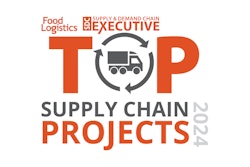
As global supply chains expand to meet growing consumer demand, they must simultaneously confront challenges including inefficiency, lack of transparency and security threats.
But many segments of traditional supply chains are plagued by inefficiencies, data silos and the ever-present risk of fraud. As executives in the supply chain sector are acutely aware, these challenges can result in significant revenue losses and reputational damage.
The COVID-19 pandemic brought these issues into sharp focus, underscoring the fragility of supply chains and the need for greater resilience and agility. The disruptions caused by the pandemic led to increased interest in digital solutions that could provide real-time visibility, traceability and enhanced security throughout the supply chain.
In this era of digital transformation, blockchain technology is emerging as a game-changer for the entire supply chain sector, from trucking to warehousing, procurement and risk management.
Blockchain is an advanced database mechanism that enables the recording of transactions (both physical and virtual) on an immutable (unchangeable) ledger, shared securely both internally and between these interlinked companies via a user-friendly interface. Ultimately, the result is a seamless exchange of value and a single source of truth that was previously impossible.
This unlocks significant value in supply chains by reducing risk, increasing visibility, and enhancing trust across complex ecosystems.
It’s becoming increasingly clear that supply chain executives who adopt this technology will be at a significant competitive advantage. But in order to truly capitalize on this benefit, it’s crucial to first understand exactly how this emerging technology, originally designed with decentralized currencies in mind, is transforming the world of supply chains.
The Blockchain Awakening: A Paradigm Shift
The adoption of blockchain technology across various industries involved in the global supply chain is remarkably low, considering its monumental potential. As few as 26% of executives across supply chain-related industries have initiated blockchain projects. This raises a critical question: are these industries overlooking a transformative opportunity to improve their operations?
Consider the example of Maersk, a global shipping giant that has embraced blockchain technology to streamline the container shipping process. By utilizing a blockchain-based system, Maersk reduced the transit time of a container of avocados from Kenya to the Netherlands by 40%, slashing paperwork and reducing the potential for fraud. Such a remarkable enhancement in efficiency and security can be a game-changer across the entire global supply chain ecosystem.
Enhanced Transparency, Efficiency, and Sustainability
Blockchain technology empowers industries across the global supply chain spectrum to achieve transparency, efficiency, and sustainability like never before. Consider the logistics industry, where blockchain-based systems can provide real-time tracking of goods, leading to a significant reduction in delivery times and costs. Research reveals that such implementations can result in efficiency gains of up to 30%.
Moreover, the enhanced transparency offered by blockchain enables industries to embrace sustainability initiatives with confidence. In the packaging industry, for instance, blockchain can be used to track the sourcing and usage of environmentally friendly materials. This enables companies to reduce their carbon footprint, contributing to a greener and more sustainable supply chain ecosystem.
Automating Supply Chain Processes: The Age of Smart Contracts
Efficiency is the lifeblood of industries across global supply chains, and smart contracts are at the forefront of this efficiency revolution. Capgemini estimates that smart contracts can lead to a staggering 90% reduction in processing costs. Across sectors, including procurement and risk management, smart contracts can automate compliance checks, payments, and contract enforcement, thereby mitigating errors and reducing operational costs.
In the procurement industry, blockchain's impact on supply chain efficiency cannot be overstated. By streamlining the procurement process, companies can reduce lead times, improve supplier relationships, and minimize costs. Smart contracts can facilitate automatic reorder triggers, payment processing and compliance checks, ensuring seamless procurement operations.
And when it comes to risk management, blockchain's immutable ledger ensures the authenticity and integrity of data, which is vital for assessing and mitigating risks. It also offers real-time access to data and a comprehensive audit trail. This transparency enables risk managers to make informed decisions swiftly. For instance, in the insurance sector, claims processing can be expedited by using blockchain to verify the authenticity of claims data. Whether it's tracking the origin of raw materials, monitoring shipment conditions or verifying compliance with safety standards, blockchain enhances risk management by providing real-time, reliable data.
Finally, blockchain can transform procurement processes by automating supplier verification and enhancing compliance. Smart contracts can automate payments, trigger orders when stock levels are low, and enforce compliance with regulations and quality standards. This reduces human errors, streamlines procurement, and minimizes the potential for fraud.
Embracing the Global Supply Chain Revolution
As leaders in industries covering the entire global supply chain, you wield the power to pioneer innovation and secure the future of your businesses. Embracing blockchain technology is not merely an option; it's an absolute imperative in today's dynamic market landscape.
The paradigm shifts in global supply chains facilitated by blockchain is a potent catalyst for growth, efficiency, and sustainability. According to forecasts, the adoption of blockchain across industries involved in the global supply chain is projected to increase by 15% annually over the next five years.
Blockchain technology replaces the current fragmented tracking of supply chains with an interoperable solution – one that can significantly reduce the risk of unethical sourcing, shipping delays, inadequate storage or ineffective distribution of goods. Industries that have adopted these advancements have seen dramatic efficiency, cost and security improvements.
The question now is not whether you can afford to embrace blockchain - it is whether you can afford not to. The future is blockchain and those who embrace it will shape the future of global supply chains.




















